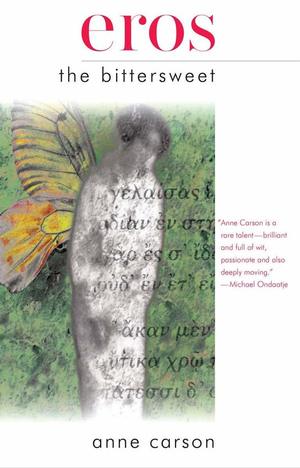Desire is at the core of being human. In Anne Carson’s book, Eros the Bittersweet, we encounter the complexities of desire through a scholarly lens — a Greek poetic perspective on how desire cannot exist without a lack of what we seek, a hole we might not have even known was there.
There’s an image, in reference to Aristophanes’ speech in Plato’s Symposium, that will not leave my mind after reading this book. It’s a ridiculous account of how humans used to be spherical organisms made up of two people, happy and in love in their perfect spheres, rolling around. In their love they reach for Olympus and, having rolled to the top, Zeus chops each sphere in half.
Now there are half spheres bopping around trying to find their other halves.
Anne Carson invokes the image of spheres as a comical portrayal of what she’s talking about — desire. There are two elements of desire that warrant further pause.

First, I could relate to the feeling of lacking, of searching, but not to the notion that a single person — my other half — could be the solution. Second, the realization that it is not the finding and fulfilling our desires that make us human, but rather the puzzling discovery that, upon fulfillment, you peer in and find that there’s still a hole.
Carson points out the common misunderstanding of eros as love attained, when in fact, eros is the reaching out, the desire: “The words we read and words we write never say exactly what we mean. The people we love are never just as we desire them. The two symbols never perfectly match. Eros is in between.”
How do we know that what we desire, when attained, will be fulfilling? Desire suggests its object will provide a sense of eternal oneness, the merging of two half spheres — or so we think. It is easy to understand this question in terms of a partner or lover. But it is only a matter of time before the lovers reach for Olympus. Eternal oneness is not enough.
We reach a goal and then we move on. For all the pain that needing more causes, perhaps we live a little for this pain. As Carson writes, “The poets represent eros as an invasion, an illness, an insanity, a wild animal, a natural disaster. His action is to melt, break down, bite into, burn, devour, wear away, whirl around, sting, pierce, wound, poison, suffocate, drag off or grind the lover to a powder.” Our understanding of eros only baffles us further as the meaning of life or a seeming solution is painted as the problem. It is a farce that a lover will satisfy.
For a long time now, I’ve tried to put words to the desperation that surrounds having goals and not reaching them, or achieving them only to find others unearthed. Life’s unending to-do list — the satisfaction of completion lasts only until a new objective arises, like a lover whom, upon receiving the gift of eternity with their beloved, goes out and finds that the garden needs tending. Why, then, do we get up in the morning if the following day is filled with desire in all its damaging, piercing, suffocating glory?
Carson captures this dichotomy in the image of the nonlover. “He measures his emotions out like a miser counting gold. There is no risk entailed in his transaction with eros because he does not invest in the single moment that is open to risk, the moment when desire begins, ‘now.’” The only other option to being a lover, a human, is to be a nonlover, to be unhuman.
The scholarly approach Carson takes makes it unclear if she is trying to make the reader accept the ancient Greek conception of eros or some variation on it. My takeaway is that eros inspires change in us that is essential. Otherwise we are like the miser counting gold, controlling life’s variability, disinterested in the risks of desire essential to being human.
Carson further dissects eros as it pertains to her love of language and learning. To this I could relate most profoundly. The desire to move from not knowing to knowing is a beautiful place to be, and a near constant state for the curious.
Learning is something alive. Eros relates to Socrates’ understanding of wisdom as something alive, Carson writes, a “living breathing word, that happens between two people when they talk. Change is essential to it, not because wisdom changes but because people do, and must.”
The Greek poets harped on the risk and loss that comes with desire. Carson asks us “What makes the risk worthwhile?” My answer is that, when we risk, when we embrace the changes in our life — whether the change is chosen or thrust upon us — there is a relief.
We let go of the control and dream as humans and lovers.
Natalia Yepez Frias is a higher education consultant based in Chicago.